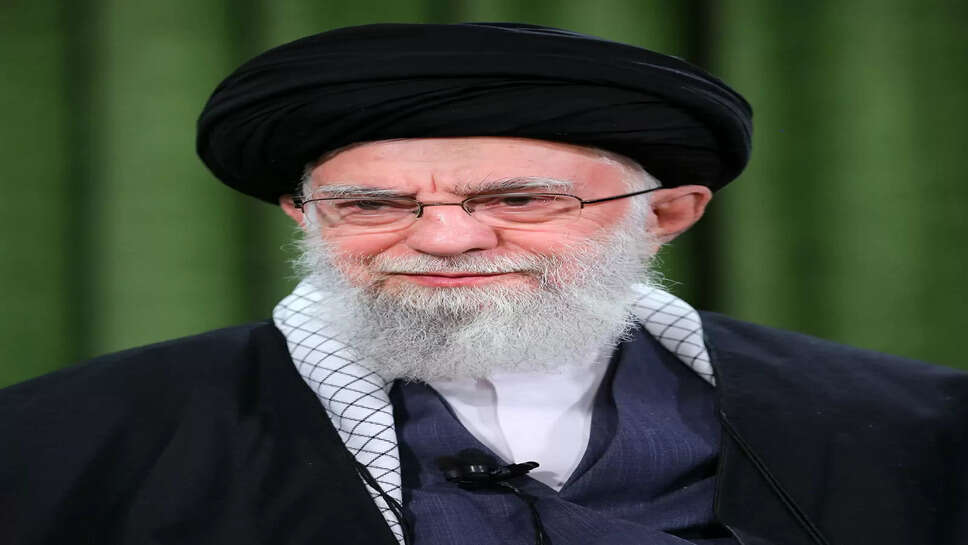No Talks Without Respect: Iran Warns Trump Over Insults to Supreme Leader

In a candid and uncompromising statement, Iran has signaled that any future negotiations with the United States hinge not only on substantive terms—but also on the tone and demeanor of America’s leadership. According to Iranian officials, the moment Donald Trump assumes the presidency again, he must abandon the aggressive rhetoric and insulting personal remarks directed at Iran’s Supreme Leader, Ayatollah Ali Khamenei, if he hopes to open the door to meaningful diplomacy.
This stipulation reflects a deep mistrust and a broader challenge that has bedeviled U.S.–Iran relations for decades: mutual respect, or the lack thereof. This article explores why Iran’s demand might shape future negotiations, how tone matters in diplomacy, and what a reset of discourse could—or could not—lead to as both countries consider a potential detente.
1. Tone as a Diplomatic Tool
Diplomacy is often said to be the art of balancing words as carefully as weapons. For Iran, the language used by foreign leaders is not fluff—it reflects core attitudes. To threaten, insult, or mock Iran’s revered Supreme Leader carries deep cultural and political weight, portraying the United States as not just adversarial but disdainful.
From Tehran’s perspective, respect for leadership—even amidst vehement disagreement—is non-negotiable. A confrontational tone suggests hostile intent, setting the stage for rejection before any talks even begin. In contrast, measured, neutral language creates an environment where dialogue can proceed without immediate barriers.
Iran’s message is clear: if the U.S. wants to re-enter nuclear talks or discuss sanctions relief, it must first reorient how Americans speak about Iranian leaders. The words, they imply, are the handshake that begins the deal.
2. The Trump Era: A Case Study in Confrontational Rhetoric
During his first term, Donald Trump did not mince words when speaking about Iran’s leaders. He made pointed reference to Ayatollah Khamenei as a "dictator," ridiculed him on Twitter, and used harsh language to frame Iran as a "dangerous regime." His decision to withdraw from the nuclear deal (the Joint Comprehensive Plan of Action, or JCPOA) and reinstate sweeping economic sanctions further crystallized his adversarial stance.
In response, Iran hardened its position—advancing its uranium enrichment capabilities and increasing regional activity. Each insult from Washington, they believed, amounted to recklessness rather than diplomacy. That verbal aggression, compounded by policy moves, convinced Tehran that Trump's administration was uninterested in partnership and committed solely to regime-pressure.
Iran’s claim now—that Trump needs to clean up his language before a deal is conceivable—is rooted in this history of mutual offence. For them, tone matters because it signals intent. If you're insulting me, you’re not my partner; you’re my adversary.
3. From Bitterness to Breakthrough: Can Words Create Space?
Psychology demonstrates that tone and respect matter in human interactions; diplomacy is no different. In cross-cultural engagement, especially with nations priding themselves on sovereignty and dignity, who is insulted becomes inseparable from what is negotiated.
With this in mind, diplomats in previous negotiations devoted time to careful phrasing. Iranian officials remember when Secretary John Kerry complimented Iran’s nuclear scientist credentials or when Obama addressed the country as "a sovereign nation with deep history and culture." That dignified approach helped create a climate conducive to breakthrough—one that ended in the 2015 JCPOA.
Iran fears that repeating the contemptuous tone of 2018 would make a new deal impossible. So now, they call for a reset—realigned rhetoric that enables formal negotiations, with respect as the gateway.
4. Trump’s Political Incentive: Does He Want a Deal?
From Washington, one must ask: Does Trump intend to negotiate? And under what conditions? Historically, Trump was a skeptic in 2016—calling the JCPOA "horrible," withdrew from it in 2018, and doubled down on maximum pressure. Islamic Revolutionary Guard Corps leaders, including Khamenei, were sanctioned. The tone was consistently aggressive.
Now, approaching a hypothetical second term, there may be shifting calculations. Trump might recognize that his foreign policy credentials could benefit from renewed diplomacy. But persuading domestic audiences—and satisfying conservative allies—would require careful reporting. The last thing Trump wants is to appear "soft" on Iran.
That means the price—a respectful change in language—is not trivial. It would require him to forgo some of his hallmark pugnacious style. For Iran, however, tone is a bargain-breaker. They’re saying: negotiate if you can stop insulting us.
5. Is This Just Words—or Leverage?
Critics may dismiss Iran's position as symbolic, even melodramatic. But signaling matters in nuclear diplomacy. Take North Korea, where handshake protocols and address forms have carried weight. Diplomacy among states with fraught relations relies on small gestures and subtle cues.
Iran’s demand is less about ego and more about removing friction. If an adversary leader starts diplomatic engagement by insulting your leadership, why would you negotiate? This is especially true in Iran, where regime legitimacy is tied to the person of Khamenei.
At the same time, asking a fiery political figure like Trump to adopt a patrician tone is asking a lot. Yet Iranian officials believe that such a shift would be a sign of seriousness—not weakness. It would signal that the U.S. is prepared to engage in earnest, not just as a performance for media.
6. The Global Dimension: Allies, Adversaries, and Watching Eyes
Around the world, leaders and capitals watch such rhetoric for signs of stability or escalation. Close U.S. allies, like European powers, criticized Trump’s tone, urging Washington to maintain decorum. Meanwhile, Iran’s neighbors track rhetoric to predict policy shifts.
If Trump adjusts his tone—throwing in neutral or even respectful language—it may facilitate coordination. Europe, Russia, and China, proponents of JCPOA reentry, would see it as alignment with their call for respectful diplomacy.
Conversely, if Trump ignores Iran’s demand and doubles down, Tehran may publicly reject any U.S. overture. That could close the window not just for Trump but for global deals. The language, while symbolic, would shape the political opportunity for talks.
7. Can Rhetoric Change Reality?
Words alone won’t solve impasses. Iran demands two things beyond tone: liability protection for its nuclear programme, relief from sanctions, regional respect, and a long-term guarantee. The U.S. will likely insist on transparency, inspections, and verifiable limits.
But when treaty terms are structured, words suggest diplomacy. A respectful statement toward Khamenei can ease tensions, reduce national pride offense, and allow negotiators some maneuvering room. It doesn’t “buy the safety net”—but it may allow room in the negotiation tent.
Iran’s position—ask Trump to clean his tone if he wants a deal—is therefore not childishly symbolic. It’s a calculated lift—a soft entry condition for a hard process.
8. Opening Lines: What Trump Could Say
So what would an acceptable tone look like from Trump? It doesn’t need to be faint praise. It could be as simple as:
“Iranians are our neighbours in the region. Dialogue with any leader is tied to respect—regardless of differences.”
Or:
“I’ll speak with Iran’s Supreme Leader as I would with any head of state—firmly, but respectfully.”
That kind of statement would allow Trump to appear strong while conceding enough decorum that Iran might answer back. The path is subtle but real: reframe the phrases without shifting policy drastically.
A Battle of Words Worth Watching
The deep-rooted mistrust between the U.S. and Iran extends well beyond border disputes—it is entrenched in identities, pride, and culture. Iran’s call for Trump to adopt respectful tone is not prissiness—it’s diplomacy. It borders on a condition that tone is not meaningless—because, for Iranians, it’s often the only thing standing between insult and engagement.
Trump, if he genuinely seeks a negotiation, faces a test: will he sacrifice an element of his rhetorical brand for strategic gain? It may seem small—but in diplomacy, the smallest changes in tone can create space where deals are built.
If Trump can say "I respect Iran’s leadership as leaders," Iran may respond. It doesn’t solve nuclear puzzles, but it dismantles a barrier. And sometimes, in the volatile world of international diplomacy, that’s where it starts: with words.
